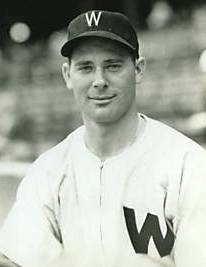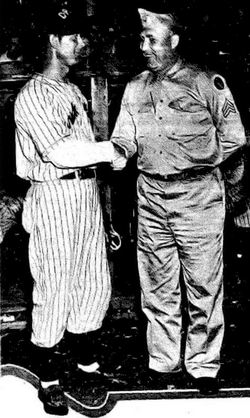

|
|
Steve Sundra
Date and Place of Birth: March 27, 1910 Luxor, Pennsylvania
Died: March 23, 1952 Cleveland, Ohio
Baseball
Experience:
Major League
Position: Pitcher
Rank: Private
Military Unit: US Army
Area Served: United States
 Stephen R “Steve” Sundra was born on March 27,
1910 in
Stephen R “Steve” Sundra was born on March 27,
1910 in
Sundra pitched for the Quincy Indians of the Three-I League and the Burlington Bees of the Mississippi Valley League in 1932. In 1933 he was 14-12 with the Zanesville Greys of the Mid-Atlantic League and had a 7-7 record with the Toledo Mud Hens of the American Association the following year.
The Indians traded Sundra to the New York
Yankees organization in 1935 and he made his major league debut on
April 17, 1936. Sundra remained with the Yankees through 1940,
enjoying his best season in 1939, when he was 11-1 with a 2.76 ERA
and pitched in the World Series against the Cincinnati Reds.
The Washington Senators purchased Sundra from
the Yankees in March 1941 and he was traded to the St Louis Browns
in June 1942. At 33, he won a career-high 15 games (15-11) in 1943
and had a 3.25 ERA. Sundra won his first two starts of 1944 -
allowing just three hits in a 3-1 win over
 |
| Sundra (left) with Sergeant Red Ruffing in 1945 |
Sundra was in the armv transportation corps and
made four trips to the
Private Sundra was discharged from service in February 1946 and rejoined the Browns. But after just two relief appearances – in which he allowed nine runs over four innings – he was released by the club on May 29.
Sundra brought suit against the Browns under the GI Bill of Rights, claiming he should have been retained for a year. He asked for $5,413.40, the difference between what he had been paid and his $8,000 salary, but Federal Judge Roy W Harper, in a decision handed down at St Louis, on December 13, 1949, denied the claim.
Sundra, working in the construction business and
living in
Mounting doctor's bills left Sundra's finances
near rock bottom and a benefit basketball game was held in the
Created September 3, 2008.
Copyright © 2008 Gary Bedingfield (Baseball in Wartime). All Rights Reserved.